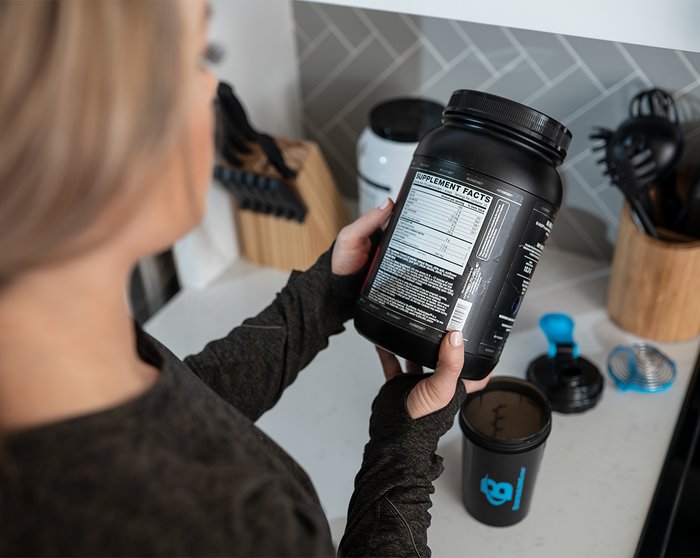Whether you're looking to build muscle, lose weight, or improve your athletic performance, a protein supplement can raise your nutrition to the next level. But with so many choices, how do you know which protein powder is right for you?
As co-founder of the International Society of Sports Nutrition and co-creator of Bodybuilding.com's Foundations of Fitness Nutrition, I'm here to share my top three tips for picking the right protein supplement for you.
Know A Product's Serving Size
The first topic is protein serving size. Every supplement contains a nutritional facts label, and on that label, you'll see a serving size. That serving size tells you how many grams of product are in each serving. Next, look at the grams of protein. On any nutrition or supplements facts label, the amount of protein in grams must be listed.
What are you looking for? Let's use an example. Say we are looking at Protein Product X, and we see the serving size for the product is 30 grams. Then, when we scroll down to look at the protein portion of that label, it says there are 24 grams of protein. My first question when I see this is, what are those other 6 grams?

The point here is that by comparing those two numbers, you're looking at how much actual protein you get per serving. What ideal grams per serving should you be looking for? Research has shown that 20-40 grams of protein per serving is what's needed for optimizing and promoting muscle protein synthesis.[1]
The takeaway lesson is to look at the serving size and the grams of protein per serving. Make sure it falls in the range of 20-40 grams to ensure you're getting the biggest protein bang for your buck.
Pay Close Attention To The Ingredient Hierarchy
The second topic of interest when I'm working with athletes to help choose a protein is looking at the ingredients and understanding their hierarchy. What do I mean by hierarchy? By law, ingredients must be listed in descending weight order. The ingredient that makes up the greatest volume of the product must be listed first. For example, if I see that the first ingredient is maltodextrin, and the second ingredient is protein, I know that you're going to find more carbohydrate (maltodextrin) than you will protein in that product.
The type of protein also matters. So again, when looking at the hierarchy, keep in mind that protein isolates are higher in protein per gram than protein concentrates, which has to do with how the proteins are processed.
By law, protein isolates must contain 90 percent or greater protein by weight, while protein concentrates can contain 35-80 percent protein by weight.
So, when choosing a protein product, one thing you can do to ensure you're getting the highest quality protein for your buck is to look for whey protein isolates as the first ingredient, before protein concentrate appears.
Vegetarian? Understand Your Protein Powder Options
The third tip when choosing dietary proteins—protein supplements, protein powders, protein drinks—that I believe is important is a discussion on vegetarian and vegan proteins. When protein comes from dairy, dairy comes from a cow, and that makes it an animal product. So, someone who avoids animal products would not want to consume whey.

I believe this discussion is important to address the common myth that vegetarian bodybuilders can't achieve the same muscle mass and body composition as those who eat meat.
Vegetarian proteins, such as brown rice isolate, hemp protein, pea protein, and soy isolate, are all popular vegan options. I personally recommend the brown rice isolate, which has been found in research studies to support muscle growth and muscle maintenance to the same degree that whey protein does.[2]
In summary, protein is one of the most researched dietary supplements, but don't be fooled by poor protein, don't be fooled by misleading advertising, and don't be fooled by overly aggressive marketing. Trust the evidence-based information I shared with you today and that you read here on Bodybuilding.com.
References
- Jäger, R., Kerksick, C. M., Campbell, B. I., Cribb, P. J., Wells, S. D., Skwiat, T. M., ... & Smith-Ryan, A. E. (2017). International society of sports nutrition position stand: protein and exercise. Journal of the International Society of Sports Nutrition, 14(1), 20.
- Purpura, M., Lowery, R. P., Joy, J. M., De Souza, E. O., Kalman, D., Jäger, R., & Wilson, J. (2014). A comparison of blood amino acid concentrations following ingestion of rice and whey protein isolate: a double-blind, crossover study. Journal of Nutrition and Health Sciences, 1(3), 306.

